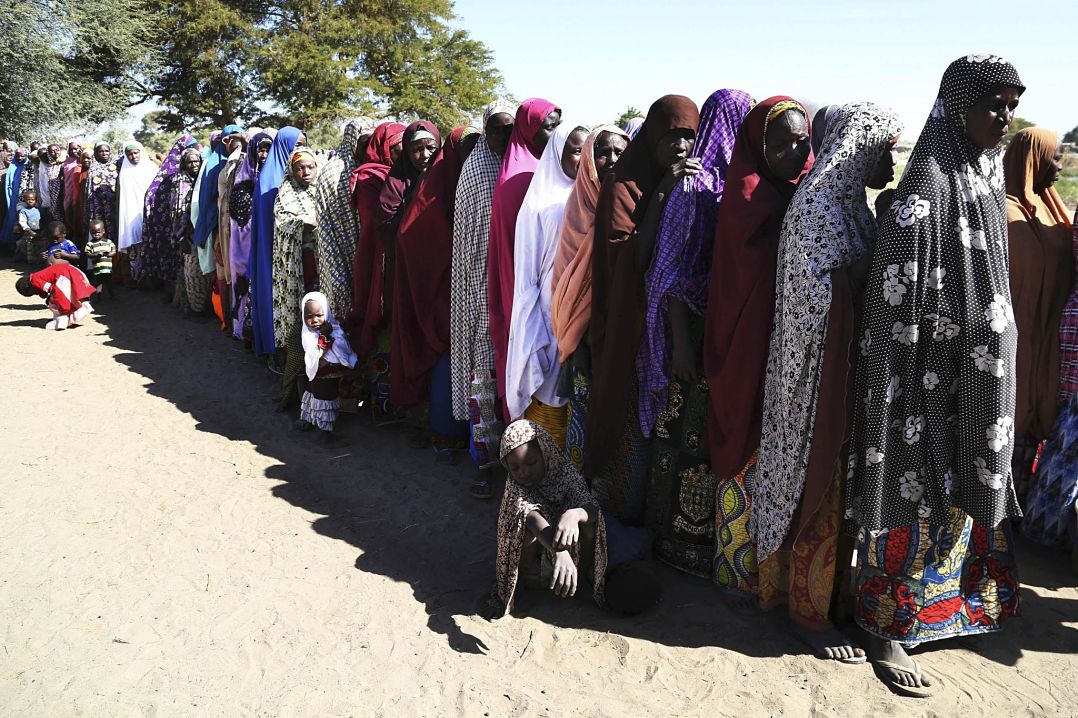While the number of refugees fleeing Syria, Iraq and Afghanistan continues to make world headlines, there is another conflict that rages on that has received little attention from the media. A worsening campaign of attacks by militants in northeast Nigeria is deepening a humanitarian crisis for tens of millions of people in what’s already the poorest region of Africa’s top oil producer.
Attacks since the beginning of 2014 by Boko Haram, an armed group, in over 40 villages in north-eastern Nigeria, have displaced thousands of people. People forced to flee their homes are dispersed throughout Nigeria and in neighbouring countries, where they face serious problems in accessing food, water, shelter, and other basic rights.
Mausi Segun a Nigerian researcher for Human Rights Watch (HRW) says that at least 2.5 million people have been displaced by the violence in the region from the Borno state.
Borno is a state in north-eastern Nigeria. Its capital is Maiduguri. Most recently eight people were killed Sunday when a female suicide bomber detonated her explosives among women and children arriving in Maiduguri seeking to escape Boko Haram violence in the countryside.
The surge in violence is worsening poverty and hunger in the northeast and diminishing hopes that the millions of people who’ve been displaced by the conflict will have a chance soon to return home.
“Most of the displaced people, at least 1.2 million are in Maiduguri and just about 8 percent of that number are in IDP camps (temporary refugee camps),” Segun went further.
“The situations in the camps are rather abysmal very little in terms of basics services and the rights of displaced people have been neglected by the Nigerian government; it does appear that the situation has stretched the resources of the authorities.”
Nigeria’s ability to finance its war on Boko Haram and care for those affected by it has been hampered by a 50 percent slump in crude prices in the past year, which forced the state to scale back its budget.
Despite President Muhammad Buhari’s campaign promise to rid Nigeria of Boko Haram, violence has escalated. Since Nigeria’s national election, the already severe situation in Nigeria has deteriorated into a major humanitarian crisis.
However, Segun says that generally there is still a level of optimism for things that Nigerians voted for might still be implemented by the new Buhari administration.
“In terms of the political situation Nigeria is on a new trend on training a new administration from May this year and the government is just about to begin to settle down,” she continued.
Not only are the millions of internally displaced peoples (IDP) fleeing from the conflict targets of direct violence, they are also going without food. More than 4 million are facing severe acute levels of food insecurity and malnutrition in northeast Nigeria alone. The number grows when you include neighbouring countries.
“Up to 300000 people have fled to neighbouring countries from Nigeria as a result of the conflict and more than 90 percent are living with host families inside and outside the borders of Nigeria,” Segun explained.
She adds that as a result of ongoing attacks by Boko Haram neighbouring countries have been expelling refugees coming from Nigeria as fears have risen about Boko Haram infiltrating the refugees crossing borders.
This view has been shared by countries across Europe that are closing their borders to refugees for fears that members from the Islamic State of Iraq and Levant group (ISIL) may have infiltrated amongst the refugees in order to cross borders within Europe more freely.
Segun says that most aid being carried out in the camps are as a result of aid being given by international humanitarian organisations as well as philanthropic Nigerians and that the (Nigerian) government definitely needs to do more both at a federal and a state level.
“A lot more attention needs to be paid to the rights of displaced people including the rights to basic shelter,” Segun stated.
“Displaced people are living in overcrowded rooms and people are falling ill due to overcrowding lack of ventilation,” Segun continued.
Another big problem is the lack of food as many children are falling ill to malnutrition.
“For people who have fled from their homes with just the clothes on their backs they have nothing and are totally reliant on what the government and humanitarian organisations can provide,” Segun expressed.
“They are not receiving provisions that will be able to make a difference in their lives.” VOC (Umarah Hartley)






 WhatsApp us
WhatsApp us 

